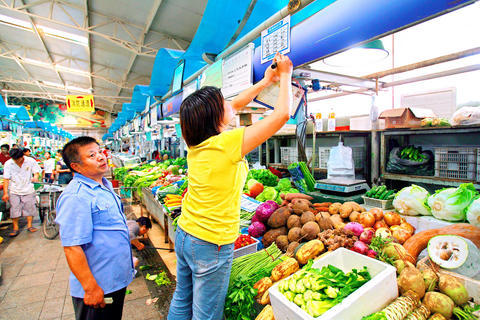China's inflation rate last month soared to its highest level in more than a decade, official data showed yesterday, sounding new alarm bells that will likely lead to further monetary tightening.
The consumer price index rose 5.6 percent last month compared with a year earlier, nearly twice the official 3 percent target set for all of this year, the National Bureau of Statistics said.
"Various economic indicators are on the rise, and they may enter into the alarm zone," the China Securities Journal reported, citing Zhang Tao (

PHOTO: AFP
"The objective now is to prevent the economy shifting from fast growth to overheating," Zhang said in remarks made prior to the official release of the inflation data.
Last month's figure was on the back of a sharp 15.4 percent spike in food prices, particularly the price of meat, which rose 45.2 percent from the same month in last year, the bureau said.
It is a trend of immense concern for most Chinese families, who on average spend about one-third of their consumption on food.
In a high-profile show of political will to act on the issue, Chinese Premier Wen Jiabao (溫家寶) has intervened, urging producers to find ways to ensure affordable pork, a main source of protein for most of the country's 1.3 billion people.
"Pork was a main factor behind July's inflation, but prices of vegetables, usually cheap in July and August, were also high due to disastrous weather," said Cheng Manjiang (程漫江), an analyst with Bank of China International in Beijing.
The China Daily reported on its Web site that last month's inflation was the steepest monthly increase since February 1997, with Western economists confirming the assessment.
The inflation rate, an acceleration from June's 4.4 percent rise in consumer prices, makes it much more likely China will hike interest rates, economists said.
"With this massive headline number, plus evidence of heightening central bank concern, we believe the chances of another rate hike soon are very high," said Stephen Green, a Shanghai-based economist with Standard Chartered.
With last month's level of inflation, and with the one-year deposit rate at 3.33 percent, people stand to lose more than 2 percent on their savings if they put their money in the bank. This makes it even more tempting to place the money in stocks instead, increasing the likelihood of new, steep rises in Chinese share prices.
The benchmark Shanghai Composite Index has jumped more than 75 percent this year, after surging about 130 percent last year.
The government is concerned a bubble is developing, which, once its bursts, could lead to immense pain for large sectors of Chinese society.
China has already hiked interest rates three times this year, most recently last month, after government data showed the economy rising by a whopping 11.9 percent in the second quarter.
In the first seven months of the year, consumer prices were up 3.5 percent from the same period last year, statistics bureau said.

MORE VISITORS: The Tourism Administration said that it is seeing positive prospects in its efforts to expand the tourism market in North America and Europe Taiwan has been ranked as the cheapest place in the world to travel to this year, based on a list recommended by NerdWallet. The San Francisco-based personal finance company said that Taiwan topped the list of 16 nations it chose for budget travelers because US tourists do not need visas and travelers can easily have a good meal for less than US$10. A bus ride in Taipei costs just under US$0.50, while subway rides start at US$0.60, the firm said, adding that public transportation in Taiwan is easy to navigate. The firm also called Taiwan a “food lover’s paradise,” citing inexpensive breakfast stalls

TRADE: A mandatory declaration of origin for manufactured goods bound for the US is to take effect on May 7 to block China from exploiting Taiwan’s trade channels All products manufactured in Taiwan and exported to the US must include a signed declaration of origin starting on May 7, the Bureau of Foreign Trade announced yesterday. US President Donald Trump on April 2 imposed a 32 percent tariff on imports from Taiwan, but one week later announced a 90-day pause on its implementation. However, a universal 10 percent tariff was immediately applied to most imports from around the world. On April 12, the Trump administration further exempted computers, smartphones and semiconductors from the new tariffs. In response, President William Lai’s (賴清德) administration has introduced a series of countermeasures to support affected

CROSS-STRAIT: The vast majority of Taiwanese support maintaining the ‘status quo,’ while concern is rising about Beijing’s influence operations More than eight out of 10 Taiwanese reject Beijing’s “one country, two systems” framework for cross-strait relations, according to a survey released by the Mainland Affairs Council (MAC) on Thursday. The MAC’s latest quarterly survey found that 84.4 percent of respondents opposed Beijing’s “one country, two systems” formula for handling cross-strait relations — a figure consistent with past polling. Over the past three years, opposition to the framework has remained high, ranging from a low of 83.6 percent in April 2023 to a peak of 89.6 percent in April last year. In the most recent poll, 82.5 percent also rejected China’s

PLUGGING HOLES: The amendments would bring the legislation in line with systems found in other countries such as Japan and the US, Legislator Chen Kuan-ting said Democratic Progressive Party (DPP) Legislator Chen Kuan-ting (陳冠廷) has proposed amending national security legislation amid a spate of espionage cases. Potential gaps in security vetting procedures for personnel with access to sensitive information prompted him to propose the amendments, which would introduce changes to Article 14 of the Classified National Security Information Protection Act (國家機密保護法), Chen said yesterday. The proposal, which aims to enhance interagency vetting procedures and reduce the risk of classified information leaks, would establish a comprehensive security clearance system in Taiwan, he said. The amendment would require character and loyalty checks for civil servants and intelligence personnel prior to